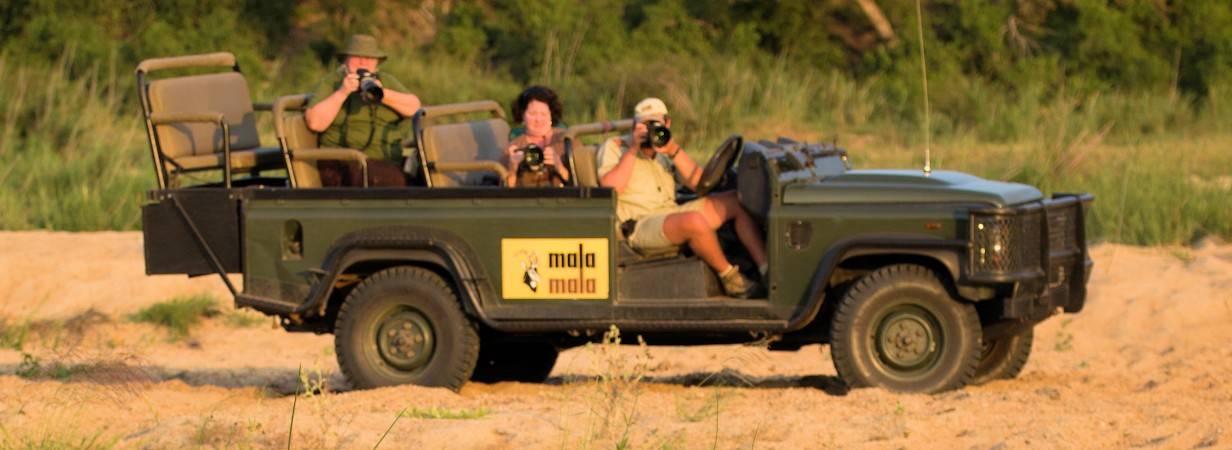
The following tips should help you to take memorable photos while on your African safari:
Digital Camera's:
There are two basic forms of camera out there on the market these days (three in you include medium format - which only the professional fashion photographers really use), cameras in the compact group and the more advanced SLR group.
Compact Camera's; These point and shoot camera's are easy to work, small and light enough not to be a hindrance when travelling and importantly do not cost the earth.
For safaris I would certainly recommend compacts camera's that have a good to excellent zoom range i.e. 28mm to +- 450mm. These are the compacts that I would recommend for Safaris (they all have good zoom lenses) or the newer versions;
- Below as of 2017;
- Canon SX 10 IS
- Fuji film S2000HD
- Fuji film S8100fd
- Nikon P80
- Olympus SP-565
- Panasonic FZ28
- Sony H50
SLR's (digital or 35mm film); Now these camera's start to command a good knowledge of photography itself, from apertures, ISO's, white balance, depth of field etc etc and the list goes on, but (thanks goodness) all these camera's also have a automatic function where the camera will do all the work.
Ok yes, you will have to start spending a few pennies on these camera's as well as lenses, but the results will more than makeup for the costs involved. Remember one thing photography is not a cheap hobby by any stretch of the imagination.
SLR camera's I would suggest;
- Pentax K-7
- Nikon D300S
- Canon EOS 500D
- Sony Alpha DSLR-A900
- Nikon D90
- Canon EOS 50D
- In a nut shell the list can go on for ever, my best advice is hold and feel each camera and pick the one that feels best in YOUR hands, it is as simple as that.
Lenses I would suggest;
- A good wide angle e.g. 10-20mm or 17-55mm (for those landscapes, sunsets and sunrises)
- A good zoom lens e.g. 100-300mm or 150-500mm (for those animals and birds that will not come close to the vehicle)
- And possibly a good Macro lens e.g. 90mm (for those insects and plants)
DO NOT FORGET TO BRING LOTS OF MEMORY CARDS!!!!!
Film Requirements:
Remember one thing about film, film is expensive and can be hard to find once in Africa, so you will need to stock up before leaving home. If you are using high-end film, please please remember to pack them in a little cooler box as the high temperature will affect them as well as protect them from X-ray machines by wrapping them in a lead foil bag of sorts! I would not recommend you IOS's of over 400 but this is your call, ISO's of 100 and less will struggle in low light situation e.g. late afternoon game drives.
Filters & Batteries:
Do not get to carried away with filters, basically, a stock standard UV filter to protect the glass of your lens and a polarizing filter.
Batteries; Bring plenty of spare batteries for motor drives, flash units, etc. It is worth noting that you can recharge your batteries at most lodges and some safari vehicles have charger units build into them, but on saying that always have a spare battery pack available.
Protection and Insurance:
Protecting your camera is essential when on safari as dust, moisture, rugged terrain and corrugated roads all have the ability to kill your camera. Invest in a padded camera bag is the simplest solution available as well as rapping all equipment in your bag in say a t-shirt, rag or towel (basically just to stop equipment from banging into each other.)
Always insure your camera equipment, your stock standard homeowners policy will usually cover your camera equipment, although you will normally have to advise your insurance company of any camera equipment so that it can be added onto your policy. It is also not a bad idea to add your camera equipment to your travel insurance as well.
Cultural interaction:
Please be courteous and respectful when taking pictures of people, I would suggest you always ask permission first (a much safer option than upsetting someone).
NEVER EVER TAKE PHOTOGRAPHS OF POLICE AND ARMY PERSONNEL, BORDER-POSTS, ARMY BARRACKS AND POLICE STATIONS, THIS IS ONE SURE WAY OF GETTING INTO BIG TROUBLE!
Binoculars:
Binoculars are a must on any safari and should automatically be included when packing, going for a walk or going on a game drive or simply just driving between destinations - you never know what you could see. It is always best to have your own pair.
+ 10x power is best for birding while 7x or 8x power is more than sufficient for wildlife (people say this should be the other way around but I like to see birds close up with a 10x zoom and something around 7x or 8x for scanning the surround bushveld or savannahs).
